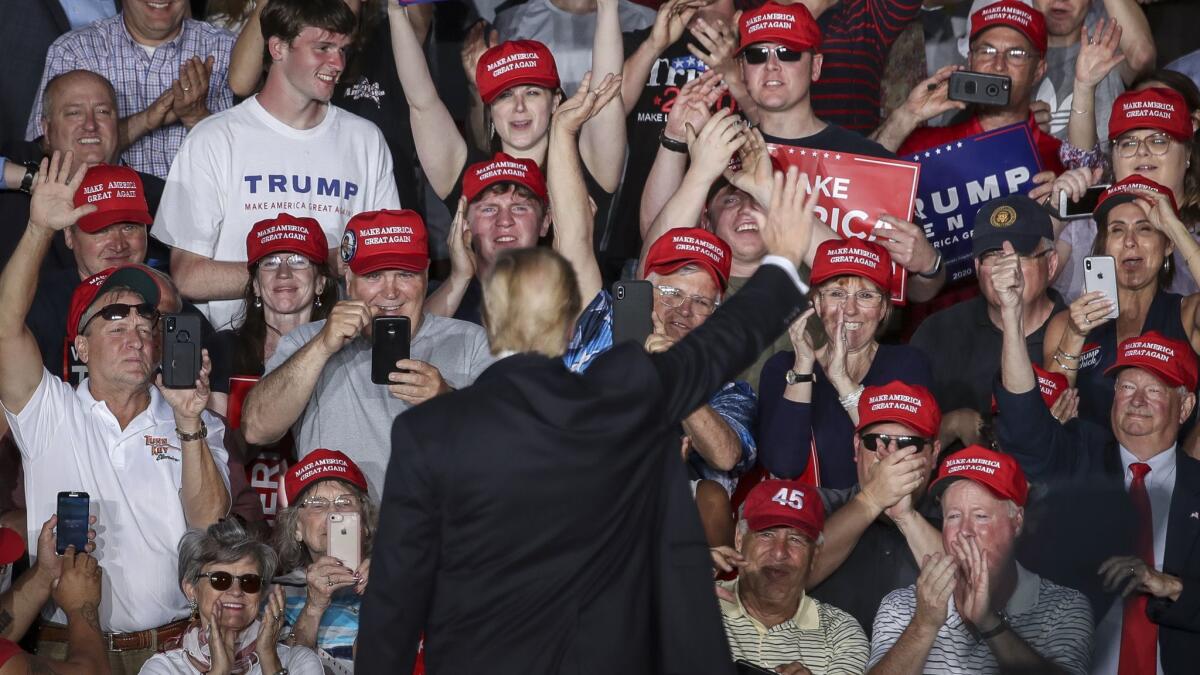Column: Trump’s biggest impediment to winning in 2020? His personality

“What’s your pitch to the swing voter on the fence?” ABC’s George Stephanopoulos asked President Trump on Sunday.
Questions of this sort are gifts to politicians, but interviewers ask them for a couple of reasons. One, they’re civic-minded. Politicians deserve the opportunity to make their cases straightforwardly — and voters deserve to hear them. Second, they save time. If you give your subject a free shot to get the talking points out of the way, you can move on to the more interesting stuff.
Trump’s initial answer started off following the standard script. He got four words off that must have had his political advisors cheering, “Safety, security, great economy.”
Ideally, this is where Trump should have stopped talking.
But the president kept going, boasting that he won 52% of the women’s vote in 2016 — he didn’t, that was the white woman vote; he got 41% of women overall. Then Trump talked some more about how the economy would help him with minorities.
“So,” Stephanopoulos asked, “that’s the pitch?”
Trump briefly got back on message. “No, I have no pitch. You know what I have? The economy is phenomenal. We’ve rebuilt our military. We’re taking care of our vets. We’re doing the best job that anybody’s done probably as a first-term president … .”
Some voters could be persuaded to vote for Trump if they could be convinced they were voting on issues rather than Trump.
This was another good place to stop. But he was only getting warmed up: “I have a phony witch hunt, which is just a phony pile of stuff. Mueller comes out. There’s no collusion. And essentially a ruling that no obstruction.”
And then Trump was off to the races, fighting with Stephanopoulos about what the Mueller report did or didn’t say. The facts weren’t on Trump’s side, as virtually every news outlet was eager to trumpet.
But politically that’s not the important part. Impeachment is catnip to the mainstream media and Democrats. Whether Trump was “set up” by the deep state and their “dirty” dossier is catnip to Republicans and right-wing media. But it seems a fair bet that the swing voters Stephanopoulos asked about aren’t intoxicated by either topic.
And that’s the problem for Trump. When you talk to people who think Trump will be reelected they point to conventional rules about how a good economy makes voters want to stay the course. That’s superficially plausible, but it leaves out the single most important fact of the political landscape: Trump’s personality. A good economy doesn’t necessarily speak for itself. Normal presidents stay on message to deny the press the ability to talk about more interesting stuff. The only talking point Trump can be counted on to stick to is himself. Hence, his claim to Stephanopoulos that no one has been treated worse than him.
President Trump doesn’t want the election to be about the economy, he wants it — and everything else — to be about him. His exchange with Stephanopoulos was an analogue of every Trump rally. He runs through the talking points about the economy or judges as quickly as possible so he can get to the really important topic: Donald Trump.
The problem for Trump is that if the central question of the election is him he will lose because he is not popular.
The Trump campaign’s Internal polling, which was leaked last week, showed him trailing Joe Biden in several must-win states by double-digit margins. Brad Parscale, Trump’s campaign manager, said the polls were irrelevant because it was “ancient” data from last March, taken before he was “exonerated” by the Mueller report. But Trump’s approval post Mueller-report hasn’t improved. Trump’s below-50 approval rating has had the least variation of any president since World War II. Most people have made their minds up about him, and most of them don’t like him.
Enter the Fray: First takes on the news of the minute »
The campaign responded by saying it had fresh data showing solid support from “informed voters.” Parscale told ABC News that since March “we have seen huge swings in the president’s favor across the 17 states we have polled, based on the policies now espoused by the Democrats.”
The key words there are “informed voters.” According to the New York Times, the polls Parscale described were “informed ballot” polls that described Democrats in negative ways before asking about support for Trump.
The common wisdom among pollsters is that if you’re citing informed voters, you’re losing. But even taken at face value, the meaning of these polls is that some voters could be persuaded to vote for Trump if they could be convinced they were voting on issues rather than Trump. For that to work, Trump would have to stop acting like Trump and make the message about something other than him. That’s a tall order.
jgoldberg@latimescolumnists.com
More to Read
A cure for the common opinion
Get thought-provoking perspectives with our weekly newsletter.
You may occasionally receive promotional content from the Los Angeles Times.







